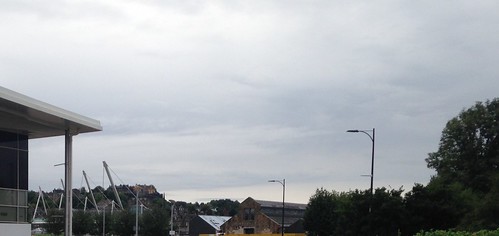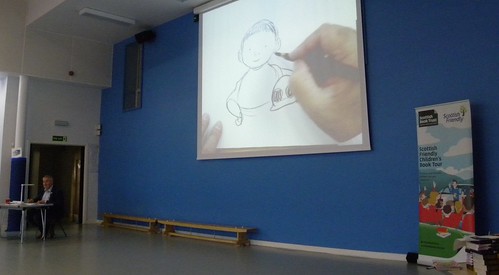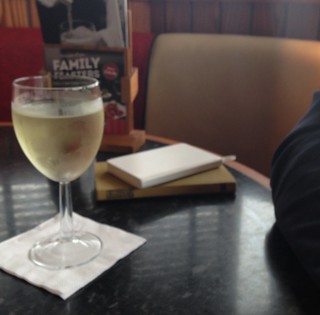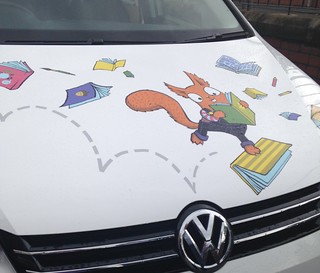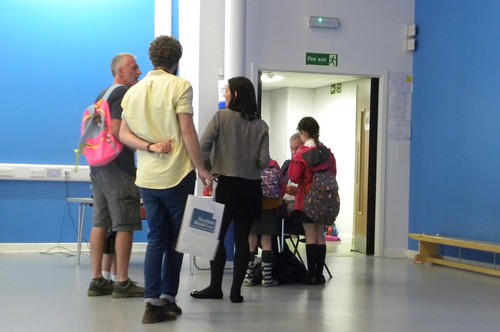It is lovely having the person you really want to interview come all the way to your home town. Especially when it is children’s laureate Chris Riddell, who lives at the other end of the country, but who’s in Scotland for some school events. His Scottish Book Trust hosts Beth and Tom drive us to Toast, where we discover it is about to close, so we pop into Frankie & Benny’s next door instead, where we insist on sitting in the fun corner booth.
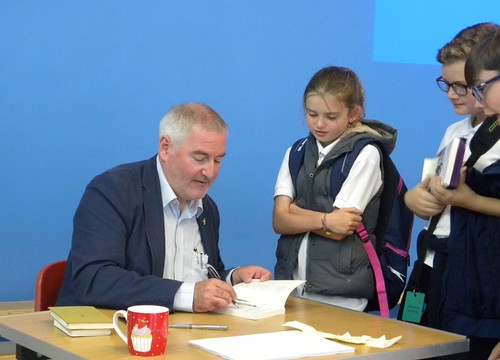
‘I was wondering, I came in at the tail end of the questions [at the school event] and I thought how quickly you have answers. Is that because you have come across most of them before, or do you think on your feet?’
The waiter arrives to take our order for drinks.
‘Could I have tea, please?’
‘I would like a glass of your Sauvignon Blanc. Large, please,’ Chris says.
Tom, ordering for Beth, who is parking the car, and himself, ‘A strawberry milkshake, and could I have a choconana?’
Chris and I both laugh.
‘I think we have the full spectrum here, I’m the alcoholic, [to Tom] you’re the sort of arrested development, Ann’s the sensible tea, and then there’s the strawberry milkshake…’
[Returning to the question] ‘It’s a mixture. There will be these questions and sometimes you have enough of them to have ready answers, depending on the mood of the school. Sometimes is it is quite nice to surprise myself, because when one is talking a lot it can feel like you’re a broken record. You know you are back in that groove, and sometimes a question will come up and you think “oh I’ve never thought about that,” and it takes you to an anecdote or a memory, and I love those moments.’
‘So have you been a pizza tester in the past?’
‘Well, erm, funnily enough, in the past few days I feel I have…’
‘Obviously [thinking of the three he’s admitted to eating].’
Chris laughs. ‘It was on my mind, so that was rather ad libbed, yeah.’
‘Children often come up with so many fantastic questions.’
‘Some of the questions one is asked often, because they’re important questions: “Who are your influences, what is your favourite book you have written, what’s your favourite book you haven’t written?” These are often asked, but they are always interesting, and like all of us I sometimes change my answer. It’s not set in stone.’
‘No.’
‘Sometimes if I’m asked what my favourite book is I’ll say The Hobbit, because I love The Hobbit. It was a very special part of my childhood. At other times I might say Flat Stanley, because that was the first book I really connected with in terms of words and pictures. I loved that. Or sometimes I will pick the classics. I might talk about Aesop’s Fables, I might talk about Hans Christian Andersen. They are all true, in their own way. And I like to tailor it to who I’m talking to and what I’m talking about; in terms of prose or illustration, or how words and pictures go together.’
‘Yes. I thought it was so sweet how that girl said she didn’t know that it was possible to draw like you do.’
‘When I talk to kids in that way when I’m drawing as well; part of the message that comes across is – and I think it will sound pretentious when I say this Ann – it’s about drawing as a verb, you know, the act of drawing. I hope I can convey that and the fun. One of my great heroes is Quentin Blake. There’s an exuberance that comes through the minute Quentin picks up a pen and starts. It’s unmistakeable. Sometimes I love a highly finished, highly polished sort of effect, and other times I like the doodle.’
‘Yes, your doodles are always with you. These children perhaps don’t realise that you can come up with something that looks so good, so quickly, just like that. Most of us can’t.’
‘Part of it I think is letting go. I’ve spent my career attempting to capture the spontaneous. Even as I say it, that’s a tautology. You know in the act of capturing you cease to be spontaneous. It’s only recently I have found that this is a lot to do with social media. I’ve been able to let go, and I’ve been able to let some of the fear go. Opening up my sketchbook becomes for me quite an interesting development in my career.’
’It’s so good to see all this. You know, people on the train, or at an event, and then quite deep thoughts about whatever’s happening.’
‘Have you noticed, Ann, they’re not my deep thoughts? They’re thoughts I’ve borrowed from other people. I’m often moved by statements I read, or poems, and then I want to channel those by printing them out and drawing next to them.’
‘Yes.’
‘It sort of boosts the audience, which is something I am really interested in when it comes to poetry. Projecting it onto the wider screen on social media, without it becoming banal. It’s got to keep its power.’
‘How many pads of paper do you go through in a day? Or a week?’
‘I haven’t done a page count, actually. I always have sketchbooks on the go, and they tend to fill up with rather monotonous regularity, so I have a sketchbook that lives in my pocket [takes out a nice white one] and I always pop into my Ryman’s to get new ones, that aren’t branded, and then I find unusual sketchbooks…’
‘That looks like an old novel.’
’It’s a blank. It is an old novel, that has been rebound.’
‘Oh, I see.’
‘And it’s such a lovely thing. And then I have bigger sketchbooks, smaller sketchbooks.’
‘But if you go away for a week, like now, you must know how many you need not to run out?’
’It depends where I go. If I’m doing this sort of thing, I know I will be in a bookshop. I know I will pass some wonderful art shops and I’m lost if I don’t go in and then come out with a bunch of sketchbooks. I love that. I always have space in my luggage so I can buy books,’ he laughs sheepishly, ‘and I make sure I have an array of pens [points to his shirt pocket] and pencils in my pocket.’
Our drinks arrive. ‘They look quite nice,’ I say about Tom’s and Beth’s concoctions, and we laugh.
‘These are the grownups’ Chris says about ours.
‘I think I’m the granny…’
‘The other thing I’ve really enjoyed about doing this sort of laureate work, is you get to hang out with people, there’s a lovely sense of doing something good, and I’ve found the whole process energising in surprising ways.’
‘That sounds great.’
‘I’ve enjoyed the need for articulacy, if that’s even a word. How you think when you’re doing it. The other thing is actually meeting people. That’s been a real privilege, being in a context I wouldn’t normally be in.’
‘Mm.’
‘Over the last year and three or four months I have been on the stage of the National Theatre, illustrating poetry readings. A wonderful thing. I’ve been at the Globe theatre hobnobbing with actors. In a normal world I wouldn’t. I’ve been standing in a huge field in summer rain while I try to conduct the biggest classroom lesson for the Guinness Book of Records. It’s the variety that’s really taken me by surprise.’
‘Yes.’
‘And I‘ve loved it! So I find that energising, but what’s really surprised me is the extraordinary feeling when I return home and I go into my studio in order to work and I feel this sense of freedom; “oh, my goodness, I’m not doing the public thing,” and I relish those days in the studio. I have done a lot of work in a very concentrated period of time, because I’ve enjoyed it so much. What I think I’ll miss in June when I stop, is I’m going to need to do that artistic recharging of one’s batteries, where you stop the creative production line and you start to recharge by looking and listening. Sometimes you just need that fallow period where you are not forever producing but you’re thinking, and I’m going to enjoy not doing anything else, just sort of looking into the middle distance, allowing thoughts to come to me. But up until that stage I feel pretty good.’
‘Sometimes when you draw your little man setting off for the train in the morning, I think, “oh my goodness, the poor thing…”’ Chris laughs. ‘“Fine, he’s got something really exciting to go to, but still it’s another day,”or so I think.’
‘My subtle propaganda is working! Drawing that is cathartic. What I’m really saying is… it’s waving a flag, I guess, and I’ve enjoyed it in the sense that this way you can put out another persona. It’s an artistic reinvention of oneself, which is a way of saying, “let’s talk about what the children’s laureate might be, let’s talk about the things we care about, let’s talk about poetry, let’s talk about this event, let’s talk about that school. One of the most touching things, a school I went to at the beginning of my laureateship, a school called St John’s in Kemptown in Brighton. It’s a school for children of profound special needs, on the autistic spectrum and beyond.’
‘Yes.’
‘I was talking to kids I wouldn’t normally see and I was so touched by the responses by the teachers I met. I went back a month or so ago, to their summer camp, in Seaford. Again it was a joy, because I sat in a little tent with kids, young adults, whom I’d met a year before, and we chatted and caught up with what they’d been doing and I thought “this is part of what I do,” but it’s not a headline occurence.’
‘No.’
‘But just as profound. Travelling with Scottish Book Trust to schools that can’t always afford authors to come and see them, I love that.’
‘Yes, I think that’s the fantastic thing about it. So, the cartoon you, that’s not you at all?’
’It’s not, in a sense, and yet it’s profoundly me. The awkward… I always draw an untied shoelace, and that’s a sort of affectation, but what it says is I’m always one step away from tripping myself up.’ Chris sounds a little embarrassed. ‘And it’s a little memento mori, “OK, you think you’re so clever, and what you’re doing, just wait, the next thing you do could be absolutely asinine.” We sort of all know this, and again I find that therapeutic.’
‘It makes me want to pick you up and pat you on the head and say “there now, you’ll be all right.”’
We laugh. ‘That’s lovely.’
‘Whereas in real life you come across as a taller, statelier kind of man.’
‘I like statelier. That’s nice.’
‘Mirroring what you’re doing.’
‘One of the great pleasures of having a career that’s lasted for a reasonable length of time, is that one becomes more confident about things, but you also know your limitations, so you become wiser, in some sense. I find myself a little less gung ho than I used to be, but I also know what is important to me. One has life experiences that profoundly change you, and I really appreciate that now. I don’t think I could have done as public a role as a laureateship even ten years ago. There was a real fault line and I have traced this to standing on stage with Russell Brand at the Royal Albert Hall. I’d got a huge amount of support, but he taught me what it is to be truly terrified.’
‘How?’
‘I thought “there’s no safety net here. This is three and a half thousand people, it’s on the stage of the Royal Albert Hall. It could go horribly wrong. There’s no reason why it shouldn’t,” and Russell turned that audience into a happy adoring throng, and I came away thinking “well, l’m never going to be able to do that, but I’m never going to be that scared again.” So when asked “Would you do this? Would you do that?” I think “It’s not the Royal Albert Hall. Yes I can do it.”’ Chris laughs. ‘That’s lovely, he’s giving me courage. So yes, in a sense I’m in a bit of a happy place right now.’
’I’m glad. What have you had to give up, being children’s laureate?’
‘Certainly, it’s not something to do with a young family, and my family is not young, so that’s been all right. One travels quite a bit, and I feel the laureate should be fully committed. I try not to turn too many things down, and to be available, but I also want to continue to practise as an illustrator so that I can use that, as part of what I do. I hope that I can pass on the baton because each of the previous laureates – all eight of them – have done me personal acts of kindness during my career. And that really struck me, these people have been my mentors, and they’ve been in positions to help me in various ways. Looked after me at book events, Michael Morpurgo sharing a stage, being such a generous personality, Anthony Browne befriending me at Bologna, introducing me to people, in a way I’ve never forgotten. One passes that on. Children’s books makes the industry a lovely place to work and I know lots of people who feel this.’
‘Yeah.’
‘Closing libraries and school libraries, we’ve got to fight for this culture. It’s under threat and those of us who know about this and know how valuable what is threatened, and what could be lost here, and that fight isn’t over, it’s never over until it stops being talked about. And I want to do my bit in that, and whenever the opportunity arises, particularly in the media, I want to support this agenda to the fore. At the risk of sounding like a broken record, I don’t care. I want to be an advocate and what really warms my heart is when a librarian says “we heard you on the radio, we heard you on the television and you gave us a mention,” and at the very least someone like me can do it, because we know that the librarians are out there every day working tirelessly, in a sector that is constantly being pared down and being, in a way, assessed for being fit for purpose and it’s such a short term way to view custodians of books and our reading future. And that’s what we are talking about.’
‘Do you think that there’s hope?’
‘There’s always hope, if we don’t accept the pragmatism of politicians. I want to say “I’m not going to accept the argument that we have to make the decision between hip replacements and library closures.” I’m going to say “get those tanks off the library’s lawn, let’s talk about what libraries do to enhance the life of the community, and more than that, what is the value of a generation growing up that sees creativity as a life enhancing positive thing that they want to forward into their future lives?” It’s huge. It goes into all sorts of areas in life. Cut that away and we’re impoverished, and not necessarily in the way an accountant who was drawing up an actuarial table would be able to quantify.’
‘No.’
‘Anyone who knows about culture knows that what we are saying is true, and so I won’t stop saying it. Particularly in schools, they are incredibly undervalued, and under pressure, and without school librarians you’re taking away one of the great pillars – an inherent structural pillar – that is the library system, because if children are not taught the value of the library, they won’t then go out into the local communities and say “this library is important.” Because they want to be taught what libraries can be. “Why do we need a school library, when we’ve got a local library down the road?” I say “you need both.” The school library supports best practice, the users are understanding what’s available. They are astonishingly good, local libraries… Local politicians are forever saying we don’t need them. It’s astounding.
What happens to local libraries is they are tyrannised by footfall and that is the law of diminishing returns. There will be slow burners, we all need the advocacy, and if we don’t have it and we don’t talk about it, then they will be neglected and libraries will fail. And there is nothing more tragic than a beautiful Carnegie library being closed, because you see all that wonderful philanthropy being being choked off in the modern world, and that breaks my heart.’
When Beth and Tom start getting ready to leave, I quickly get out my book for signing. It’s Neil Gaiman’s The Graveyard Book, so it’s not even Chris’s own, ‘merely’ his illustrations. But the ever charming Chris ‘would love to’ sign it. ‘This is one of the special ones…’
‘Yes Neil’s been at it already; it’s slightly threatening with my gravestone there.’
‘I’ll do my embellishment, a sort of…environs of the graveyard. I’ve been hugely fortunate to work with Neil, and it’s been a wonderful creative experience. Because Neil allows it to be creative and I love what comes out of that. It’s an approach to what making books is all about. A world without good art is a world where we are all impoverished, and he’s an inspiring figure.’
‘He is.’
‘Thank you, Ann, that’s a privilege. Thank you.’
‘Now you’ve got to gulp down that wine. Fast.’
‘Yes, you’re right. It will only add to my articulacy on Radio Belfast. We’re going to be talking about Roald Dahl, which I think is a wonderful thing to talk about; the idea of Roald Dahl teaching children that books are magical and enjoyable, and the expectation of a book is that you are going to enjoy it, not that you are going to have to be taught it, or you are going to have a comprehension test. There was a lovely thing on Radio 5 this lunchtime, where someone had written in saying “I think Roald Dahl is vastly overrated and is unpronounceable, and some of his stuff is amusing but most of it is rubbish.”’ We laugh. ‘That is a huge ringing endorsement as far as I’m concerned.’
And that just about sums up our current children’s laureate; he is unfailingly polite almost all the time, and then he gives in to the childish urge to laugh at someone being pompous. And Chris really is quite stately, this pizza tester who relishes the idea of being tipsy on radio. I hope he never stumbles on his – fictional – untied shoelace.

